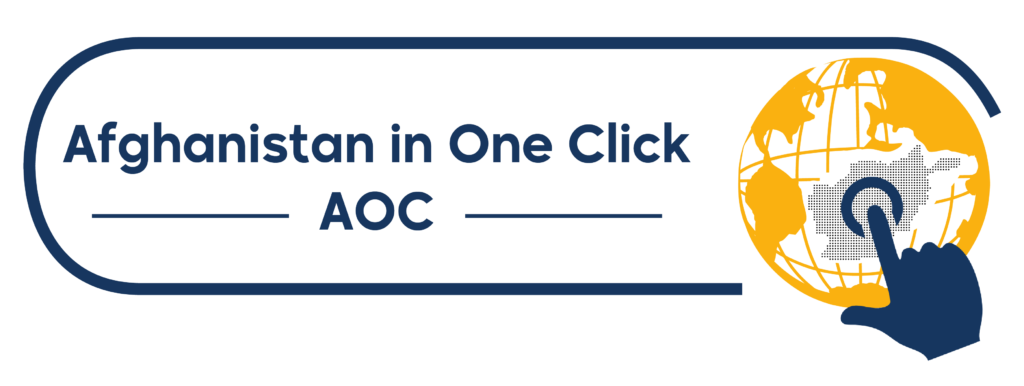‘Why am I being sent back?’ Hurt, anger for Afghans pushed out by Pakistan
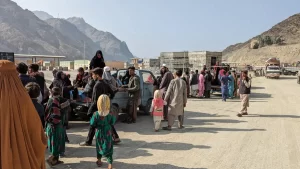 Thousands of Afghans whose only home has been Pakistan are being forced to go to a country unprepared to take them in.
Thousands of Afghans whose only home has been Pakistan are being forced to go to a country unprepared to take them in.
Abdul Rasul had the look of a man who had not slept for days as he pushed the wheelchair of his 26-year-old sister, Fari Bibi, whose face mask bore the colours of the former Afghan flag.
The patriarch of a 46-member household — one that includes his six sons and their families, two sisters, his maternal cousins, their wives and children — Rasul had travelled for more than 48 hours to arrive at Torkham, a Pakistani town on the border with Afghanistan.
There he joined thousands of foreigners preparing to leave Pakistan due to a crackdown on undocumented migration. “I came to this country when I was four years old with my father,” Rasul explained. “I still have my Afghan identification document from when I used to live there. My siblings were born in Pakistan. My parents and grandparents are buried in Pakistan. Please tell me, why am I being sent back?”
On October 3, the Pakistani government ordered all undocumented foreigners to leave the country or face expulsion. Rasul packed his large household’s belongings into a shipping container atop a truck for the 250km (155-mile) trip from the city of Rawalpindi to the Afghan border.
Pakistan, a country of 241 million people, has a population of more than 4 million Afghans. About 2.4 million of them have some form of government-approved documentation. Another 1.7 million Afghan nationals, the government says, have no paperwork at all.
This isn’t humanity
While Pakistan has accepted Afghan refugees in the past, a recent surge in violence by armed groups with roots in Afghanistan has soured public opinion and triggered a backlash against them.
Pakistan’s government has blamed Afghan nationals for the increase in violence in the country, including two suicide bombings at mosques in September. In the wake of the violence, the Pakistani government gave undocumented foreigners a deadline to exit the country by the end of October.
Several politicians, rights organisations and other groups have condemned the government’s decision, saying it singles out vulnerable Afghan citizens for whom returning might not be safe — and many, like Rasul, have been threatened with deportation despite having government-approved identification documents.
Pakistan has hosted millions of Afghan refugees since the Soviet invasion of Afghanistan in 1979. The last wave of migration came in August 2021 when the Taliban returned to power in Afghanistan, leading another 600,000 to 800,000 Afghan nationals to flee to Pakistan.
‘Kill me here, but I am not going back’: An Afghan refugee in Pakistan
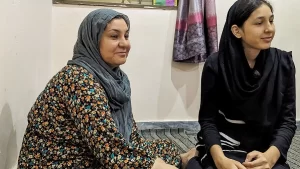 Shakira Aslami’s family is among thousands fearing an uncertain future as the Pakistani government cracks down on undocumented migrants.
Shakira Aslami’s family is among thousands fearing an uncertain future as the Pakistani government cracks down on undocumented migrants.
Islamabad, Pakistan – On a recent October evening, 41-year-old Shakira Aslami was washing dishes in the tiny kitchen of her two-room apartment when she heard a commotion outside.
As she opened the door, her son rushed in. “They are here, the police are here,” Milad told his mother in a panic.
Shakira knew what she had to do: she searched the apartment for the bag that contained her family’s most prized possessions – their passports and visa papers – while her daughter, Lima, kept watch from the stairwell as three police officers made their way through the building.
“I could see from the stairs of our fourth-floor apartment, three men were on the first floor, shouting and yelling,” Lima recalled.
Shakira found the bag – a blue backpack that Lima used to take to school with her back in Afghanistan – and frantically pulled out the papers, just as the men began banging on her door.
She presented the passports and documents to the police officers – two of whom were in plain clothes and the other in uniform and carrying a gun. One of them, she said, “shouted that I cannot live here and tried to snatch the papers from me, threatening to arrest me”.
Her neighbours – almost all of them refugees like Shakira and her family who had fled Afghanistan for Pakistan after the Taliban returned to power in August 2021 – came out of their apartments and began remonstrating with the police officers.
“Our neighbours came out and shouted: ‘You cannot enter a house like this, a woman is alone there’,” she said. Shakira’s husband was at the market buying groceries and she was alone in the apartment with their four children – seven-year-old Mansoor, 10-year-old Masood, 13-year-old Milad and 17-year-old Lima.
Shakira said the police officers eventually left, but not without being bribed. On two occasions since, other police officers have visited her home, with each set more threatening than those who came before them.
“They said if we want to continue living here, we must give them something to stay quiet or else,” she said, adding: “This is what worries me the most. They know we all live here, they can come back anytime they want and throw us away.”
ISIL claims Kabul bus attack targeting Shia Muslims
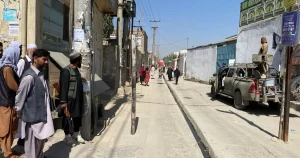 The attack is the second in weeks against Afghanistan’s historically oppressed Shia Hazara community.
The attack is the second in weeks against Afghanistan’s historically oppressed Shia Hazara community.
The ISIL (ISIS) group has claimed responsibility for a deadly bus attack targeting the Shia Hazara community in Afghanistan’s capital Kabul.
The blast in the Dasht-e-Barchi district, a Hazara stronghold, killed seven people and wounded 20, police said on Tuesday. The attack was the second targeting the oppressed community in recent weeks.
Security officials have begun investigating the incident, said police spokesman Khalid Zadran.
ISIL took credit for the attack, saying via its Amaq news outlet that it had “detonated an explosive device” on a bus carrying Shia Muslims, according to the SITE Intelligence Group.
The group claimed a deadly explosion in a sports club in the same neighbourhood that killed four people and critically wounded seven in late October, according to Taliban authorities.
The number of bomb blasts and suicide attacks has reduced dramatically since the Taliban seized power in August 2021, removing the United States-backed government. However, a number of armed groups – including the regional chapter of ISIL- remain a threat.
Afghanistan’s Hazaras and other Shia Muslim communities have faced decades of abuse and state-sponsored discrimination, including by the ruling Taliban. The oppression includes arbitrary arrests, discriminatory taxation, displacement from their traditional territory, and summary executions, according to United Nations officials.
Afghanistan is estimated to have a population of some six million Shia Muslims, the overwhelming majority of whom are Hazara.
Islamic Emirate Leader Orders Cabinet to Address Needs of Refugees
Najibullah Haqqani, the acting Minister of Communication and Information Technology, said that the leader of the Islamic Emirate in a cabinet meeting ordered all the ministries to deal with the challenges faced by the immigrants.
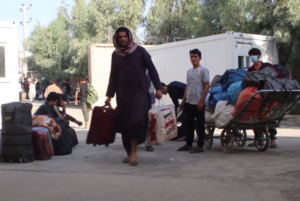 Officials of the Islamic Emirate in Spin Boldak district of Kandahar said that from the October 23, more than 100,000 Afghans who were forcibly deported from Pakistan have returned to the country through the Spin Boldak crossing.
Officials of the Islamic Emirate in Spin Boldak district of Kandahar said that from the October 23, more than 100,000 Afghans who were forcibly deported from Pakistan have returned to the country through the Spin Boldak crossing.
“All of us have patience and are working to solve these problems together. Taliban’s leader also advised all officials to provide ease for your brothers as much as you can”
“In the past month, that is, from October 23, 17,700 families have returned to the country, totaling around 104,000 people,” said Abdul Latif Hakimi, head of refugee registration and information in the Spin Boldak district of Kandahar.
A number of expelled Afghans also said the inappropriate behavior of the Pakistani military is against all human principles and said that they have returned to the country empty-handed.
They asked the government to help them.
“I was working in a hotel in Karachi, they detained me, I spent three to four nights in detention and then they deported me,” said Ahmad Jan, an expelled refugee from Pakistan.
“They used to come to our houses at night, they informed us a month ago. They were bothering us a lot and finally we got tired and moved,” said Said Jan, an expelled refugee.
From November 1, 2023 onwards, the process of forced deportation of Afghan immigrants from Pakistan has neen ongoing, and so far, thousands of families have returned to the country.
Afghanistan’s embassy in India closes permanently
In a formal statement, the Afghanistan embassy in New Delhi has declared its permanent closure. This decision marks the end of an era in diplomatic relations between the two countries, reflecting the profound changes and challenges that Afghanistan has faced in recent times.
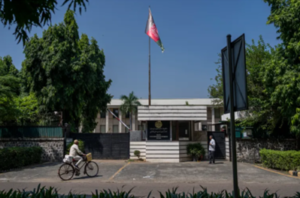 Releasing an official statement on the closure of its diplomatic mission in New Delhi, the Afghan embassy said, “Effective from November 23, 2023, owing to persistent challenges from the Indian government. The decision follows the embassy’s earlier cessation of operations on September 30, a move made in the hope that the Indian government stance will favorably change to let the mission operate normally.”
Releasing an official statement on the closure of its diplomatic mission in New Delhi, the Afghan embassy said, “Effective from November 23, 2023, owing to persistent challenges from the Indian government. The decision follows the embassy’s earlier cessation of operations on September 30, a move made in the hope that the Indian government stance will favorably change to let the mission operate normally.”
Meanwhile, The Afghanistan embassy in New Delhi has declared that it is aware some people may describe this decision as an internal conflict. They mention that there were claims of diplomats switching their support to the Taliban, adding “that this decision is a result of broader changes in policy and interests”.
“To the Afghan citizens in India, the Embassy extends its sincere gratitude for their understanding and support throughout our mission’s tenure,” it added.
Despite facing significant challenges due to limitations in resources and power, the Afghan embassy has been dedicated to working tirelessly for the welfare of its people, especially in the absence of a legitimate government in Kabul.
Over the past two years and three months, the Afghan community in India has witnessed a sharp decline, including Afghan refugees, students, and traders, who have been leaving the country. According to the embassy’s statement, the community size has nearly halved since August 2021, and the issuance of new visas during this time has been minimal.
“We assure the Afghan community that the mission operated with transparency, accountability, and a commitment to fair treatment based on the goodwill and interests of Afghanistan considering historic ties and bilateral relations with India,” it added.
Despite efforts to tarnish our image and hinder diplomatic work to support Taliban-appointed diplomats, our dedicated team persevered, prioritizing the interests of Afghanistan’s 40 million people. We worked tirelessly in challenging circumstances, securing humanitarian aid and online education scholarships, promoting trade, and advocating for a broad-based government.
It added that the Afghan embassy “exerted diplomatic pressure in its power on those who defy the will of the Afghan people by failing to form an inclusive government and denying millions of girls the right to attend school”.
Currently, there are no diplomats representing the Afghan Republic in India. As stated by the embassy, those who served in the national capital have safely relocated to third countries.
“The diplomats of the Afghan Republic have handed over the mission solely to the Indian government. It now rests upon the Indian government to decide the fate of the mission, whether to maintain its closure or consider alternatives, including the possibility of handing it over to Taliban diplomats. The responsibility of diplomats appointed by the Islamic Republic of Afghanistan has officially come to an end. The unfortunate end of the Republic mission marks the conclusion of the Afghan Republic in India,” it added.
The Afghan embassy made a noteworthy announcement on November 1, revealing the closure of its operations due to a “lack of resources” and the perceived “failure to meet Afghanistan’s interests” by the Taliban regime.
The embassy issued a clear statement asserting that some consulates operating under Kabul’s instructions and funding do not align with the goals of a legitimately elected government but instead serve the interests of an “illegitimate regime.”
Kabul appoints Bilal Karimi as Ambassador to China
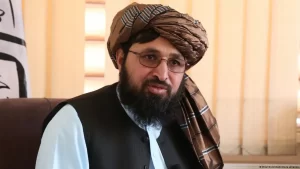 Bilal Karimi, the Deputy Spokesperson of the Taliban administration, has been appointed as the Ambassador of the de facto administration to China.
Bilal Karimi, the Deputy Spokesperson of the Taliban administration, has been appointed as the Ambassador of the de facto administration to China.
Sources from the Ministry of Foreign Affairs of the Taliban in Kabul have confirmed that Bilal Karimi has been appointed the group’s ambassador to China.
Mr Karimi previously served as the deputy spokesperson for the Taliban. However, the Taliban has not made any official statement on this matter.
According to a report, the Ministry of Foreign Affairs of the Taliban in Kabul confirmed on Sunday that Bilal Karimi has arrived in Beijing and is set to begin his work soon.
This comes as no country in the world, including China and some countries with close relations to the Taliban administration, has officially recognized the Interim administration so far.
Following the fall of the Afghan Republic and the establishment of the Taliban administration in Afghanistan in 2021, this is the first time that the Taliban administration has sent its official ambassador to another country.
China has not officially recognized the Taliban government but maintains close trade and political relations with this group.
After the collapse of the Islamic Republic of Afghanistan, China, following Pakistan and Russia, became the first country to host Taliban diplomats.
Until now, political representations of Afghanistan in various countries have been managed by ambassadors appointed during the Republic or interim heads appointed by the Taliban administration.
Over 2,000 Afghan migrants return home from Iran
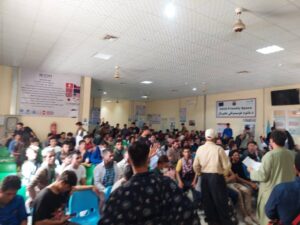 The Ministry of Migrants’ Affairs of Afghanistan reported that approximately 2,000 Afghan migrants have returned from Iran voluntarily or forcibly compulsively as part of the ongoing migration process.
The Ministry of Migrants’ Affairs of Afghanistan reported that approximately 2,000 Afghan migrants have returned from Iran voluntarily or forcibly compulsively as part of the ongoing migration process.
The ministry reported on Wednesday that a total of 1,957 Afghan migrants have returned from Iran via the Islam Qala border crossing.
The Ministry of Migrants’ Affairs, citing the head of the Herat border authority, has reported that 24 families, consisting of 91 individuals, were forcibly repatriated. Additionally, 23 families, totalling 87 people, returned voluntarily. Furthermore, 734 single individuals were repatriated involuntarily, while another 1,045 individuals chose to return voluntarily to the country.
The ministry has noted that among these returning migrants, 341 individuals have been identified as needing assistance and have been referred to the International Organization for Migration (IOM) for support.
The interim government’s Ministry of Migrants’ Affairs has announced the return of 2,000 Afghan migrants amidst a recent surge in the deportation of Afghan citizens from Pakistan, Iran, and Turkey.
On Wednesday, more than 3,000 Afghan migrants made their way back to Afghanistan, with both forced and voluntary returns, from Pakistan and Iran. This significant repatriation effort reflects the complex migration dynamics in the region.
The return of over 3,000 Afghan migrants from Pakistan and Iran on Wednesday underscores the ongoing challenges during a dire humanitarian crisis in the country.
Karzai: Girls and boys education is necessary for development of Afghanistan
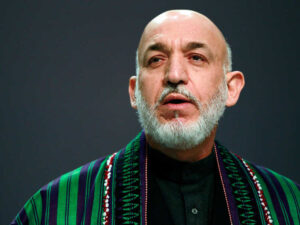
Hamid Karzai, the former president of Afghanistan, has once again emphasized the need to reopen schools and universities for girls in the country.
Karzai said on X late Wednesday that he considers the education of girls and boys necessary for the prosperity and development of Afghanistan.
This he raised with Hassan Kazemi Qomi, Iran’s ambassador and special envoy to Afghanistan and Seyed Mehdi Mostafavi, a senior member of Iran’s Strategic Foreign Relations Council in a meeting.
Karzai also said national discourse is the only way to establish lasting peace and stability in Afghanistan.
After the takeover by the Islamic Emirate on August 15, 2021, girls’ schools above grade six were closed and in December last year, universities were closed to female students.
Some experts believe that there is no justification for closing schools and that the caretaker government must take serious measures to reopen schools.
More than two years have passed since the closure of girls’ schools above and almost one year since the suspension of higher education for female students, and while the academic year of 1402 will end in a few days, there is no news about whether these bans will be lifted in the new academic year.
Employees of Germany's Main Aid Agency Arrested in Afghanistan
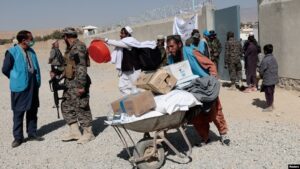 BERLIN — Taliban authorities in Afghanistan arrested four local employees of Germany’s main government-owned aid agency, according to the German Ministry for Economic Cooperation and Development.
BERLIN — Taliban authorities in Afghanistan arrested four local employees of Germany’s main government-owned aid agency, according to the German Ministry for Economic Cooperation and Development.
“I can confirm that the local employees of GIZ are in custody although we have not received any official information on why they are detained,” a ministry spokesperson told the Associated Press in a statement late Saturday.
“We are taking this situation very seriously and are working through all channels available to us to ensure that our colleagues are released,” she added.
The German Agency for International Cooperation, or GIZ, is owned by the German government. It operates in around 120 countries worldwide, offering projects and services in the areas of “economic development, employment promotion, energy and the environment, and peace and security,” according to the agency’s website.
The Taliban took over Afghanistan in August 2021, after the withdrawal of U.S. and NATO forces from the country. Many foreign missions, including the German embassy in Kabul, closed their offices.
The Taliban initially promised a more moderate approach than during their previous rule from 1996 to 2001 but gradually reimposed their harsh interpretation of Islamic law, or Sharia.
Girls were banned from education beyond the sixth grade and women were barred from working, studying, traveling without a male companion, and even going to parks or bathhouses and were forced to cover up from head to toe.
The United Nations High Commissioner for Human Rights Volker Türk said in September that human rights are in a state of collapse in Afghanistan more than two years following the Taliban’s return to power and stripped back institutional protections at all levels.
EU provides € 10 million in aid to healthcare sector in Afghanistan
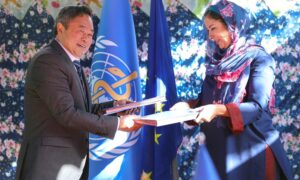 The European Union has provided €10 million to Afghanistan through the World Health Organization to combat infectious diseases and strengthen healthcare services.
The European Union has provided €10 million to Afghanistan through the World Health Organization to combat infectious diseases and strengthen healthcare services.
The World Health Organization has stated that this latest budget aims to improve preparedness for disease outbreaks and healthcare in all 34 provinces of Afghanistan.
The organization has mentioned that more than two million people are expected to benefit from these contributions.
Rafaella Iodice, the acting head of the European Union delegation in Afghanistan, said, “The European Union is deeply committed to protecting Afghans against disease outbreaks and other health and nutrition emergencies.” The organization also added that the European Union has supported more robust and flexible healthcare in Afghanistan.
Meanwhile, Luo Dapeng, the representative of the World Health Organization in Afghanistan, expressed appreciation for the European Union’s support, stating that this financial assistance will significantly contribute to reducing infectious diseases among the Afghan people.
The European Union has previously provided assistance to Afghanistan in various sectors, including a recent contribution of €61 million in November for support in nutrition, shelter, protection, and other areas for the people of Afghanistan.
Foundation stone of new industrial park laid in Balkh province
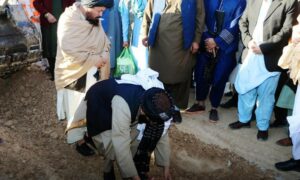 The foundation stone of a new industrial park in Balkh province was laid on Sunday in the presence of officials, elders and members of the private sector.
The foundation stone of a new industrial park in Balkh province was laid on Sunday in the presence of officials, elders and members of the private sector.
Speaking at a ceremony to mark the occasion, Noorul Hadi Abu Adris, deputy governor of Balkh province, emphasized the need for the Islamic Emirate of Afghanistan (IEA) to encourage and support the private sector. He said: “In order to solve the problems, serious measures and such projects are implemented for the development of the country.”
Syed Mohammad Naeem Mohammadi, general director of industrial parks of the ministry of commerce and industry, thanked the authorities for handing over the land, and setting up this park. He asked businessmen and investors to invest in the park.
The Ministry of Commerce and Industry said that they have allocated about 4,000 acres of land for the industrial park; the first phase will include 244 acres of this land, where a commercial center will be built.
As well as the center, 3.6 kms of walls will be built along with 10 kms of roads. This will be completed within six months. Meanwhile, Nooruddin Azizi, acting minister of commerce and industry, has inaugurated Boost Industrial Estate and National Industrial Estate in Helmand Province.
The press office of the ministry has published a newsletter saying that Azizi said the opening of industrial parks was part of their efforts to industrialize Afghanistan.
Boost Industrial Town covers 175 acres of land and National Industrial Town is on 2,000 acres of land in Helmand province.
The acting minister of industry and trade added that: “The opening of industrial towns in the country, the transformation of Afghanistan from an economy dependent on imports to an economy dependent on exports is the priority of the economic policy of the Islamic Emirate.”
Afghanistan-bound containers remain stuck at Karachi port
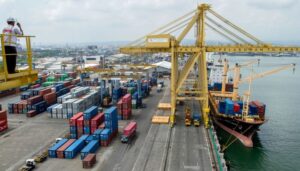 Officials at the Afghanistan-Pakistan Joint Chamber of Commerce say that Pakistan has not yet allowed Afghan traders’ goods to be released from the southern seaport of Karachi.
Officials at the Afghanistan-Pakistan Joint Chamber of Commerce say that Pakistan has not yet allowed Afghan traders’ goods to be released from the southern seaport of Karachi.
During the visit of Afghanistan’s acting commerce minister to Pakistan last week, Pakistani officials agreed to release Afghan traders’ goods stranded at Karachi port.
“Last Thursday, a promise was made that the stranded goods of Afghan traders would be allowed to be transferred, but the implementation process has not started yet,” Naqibullah Safi, the executive chief of the Afghanistan-Pakistan Joint Chamber of Commerce, said.
The Ministry of Industry and Commerce says that Pakistan is working on a plan to release the containers.
“We accept that permission has not been given yet to release the goods of Afghan traders from the port of Karachi. Pakistan is trying to start the implementation process soon,” Abdul Salam Javad, the spokesman of the Ministry of Industry and Commerce, said.
Economic experts say that the Islamic Emirate should resolve the trade problems between the two countries.
“The Ministry of Industry and Commerce should step up its efforts to release these goods so that Pakistan would implement its promise,” Shabir Bashiri, an economic expert, said.
Although Afghanistan and Pakistan have several trade agreements in place, Afghan traders face hurdles in transit via Pakistan.
Around 4,000 Afghanistan-bound containers have been stopped by Pakistan in the port of Karachi for several months.
FlyDubai resumes flights to Afghanistan after halting them 2 years ago as Taliban captured Kabul
 ISLAMABAD (AP) — Officials from Afghanistan’s ruling Taliban on Wednesday welcomed the resumption of FlyDubai flights to Kabul’s international airport two years after stopping service following the collapse of the Western-backed government.
ISLAMABAD (AP) — Officials from Afghanistan’s ruling Taliban on Wednesday welcomed the resumption of FlyDubai flights to Kabul’s international airport two years after stopping service following the collapse of the Western-backed government.
All international airlines halted flights to Afghanistan after the Taliban seized power in Afghanistan in mid-August 2021 as U.S. and NATO forces departed after two decades of war.
A United Arab Emirates-based FlyDubai flight landed in Kabul on Wednesday. FlyDubai, the sister carrier of long-haul airline Emirates, now will make two flights a day to Kabul.
The office of the Taliban’s deputy prime minister, Abdul Ghani Baradar, in a statement Wednesday described the flight resumption as “indicative of the restoration of Afghanistan’s airspace to a secure and conventional state, accommodating various types of flights.” However, nearly all Western carriers are avoiding flying in Afghan airspace.
Women’s tailoring banned in Herat, specialized women’s market closed in Balkh
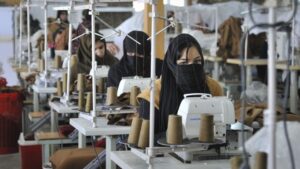 Sources from Herat confirm that the Taliban administration has prohibited women’s tailoring in the central region of this province. Simultaneously, some media outlets have reported establishing a specialized women’s market in Balkh.
Sources from Herat confirm that the Taliban administration has prohibited women’s tailoring in the central region of this province. Simultaneously, some media outlets have reported establishing a specialized women’s market in Balkh.
The source, who preferred not to be named in the report, informed Khama Press that Taliban forces entered the city Wednesday morning to inspect commercial markets. Several markets, including all women’s clothing tailoring centres, have been closed as part of this inspection.
The source added that over the past week, “whispers about the Taliban administration blocking women’s tailoring were heard, but no one believed that these warnings could become a reality.”
The exact number of tailoring shops that have been closed is not specified. It is worth noting that earlier this year, the Taliban had also banned women’s tailoring in Balkh province.
The Taliban has not provided any statement regarding this action so far. This contrasts with reports from some media outlets that indicate establishing a specialized women’s market in Balkh. It is noteworthy that at the beginning of November, the Taliban had imposed a ban on women’s tailoring in Balkh as well.
According to its sources in Mazar-e-Sharif, the daily newspaper “Ettelaat-e-Roz” reported that a women’s commercial market called “Khadija Kubra” has been closed due to tax liabilities.
This commercial market consists of around 200 shops for women, all managed by women. One of the women shopkeepers stated, “This market has been in debt for a long time; why should we suffer? The government should hold accountable those who have had outstanding debts.”
Afghanistan’s economy on the brink of collapse: USIP
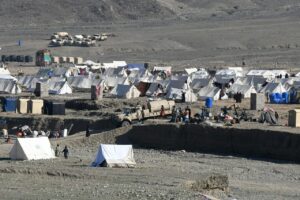 The United States Institute of Peace (USIP) said in a report published on Friday that Afghanistan’s economy is on the verge of collapse.
The United States Institute of Peace (USIP) said in a report published on Friday that Afghanistan’s economy is on the verge of collapse.
Many Afghan families are struggling to meet their basic needs.
The report blames the economic decline on factors like the return of migrants, restrictions on women’s work, and the ban on poppy cultivation without providing alternative crops for farmers.
The ban on poppy cultivation without a replacement plan will cost farmers over a billion dollars, leading to more poverty. Also, around 60,000 women lost their jobs due to a ban on makeup salons, hurting the economy.
The Ministry of Economy of Afghanistan disputes the USIP report, stating that the country’s economy is improving regionally under systematic management.
“The Ministry of Economy of the Taliban administration of Afghanistan strongly rejects the report of the United States Institute of Peace and describes it as completely unconstructive in this situation,” said Abdul Latif Nazari, the deputy minister of economy.
Economic experts suggest that the Taliban administration should create job opportunities and support investment to address economic issues.
The USIP report mentions foreign aid to Afghanistan, with expected aid of $3 billion in 2022, but it’s projected to decrease by half in 2023.
Trans-Afghan railway project estimated at $7 billion
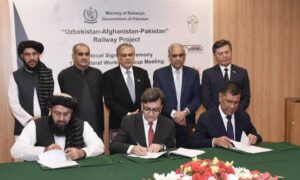 According to reports, authorities from Pakistan, Uzbekistan, and the Taliban administration have announced that the estimated cost of constructing the “Afghan Transit” railway line is approximately seven billion dollars.
According to reports, authorities from Pakistan, Uzbekistan, and the Taliban administration have announced that the estimated cost of constructing the “Afghan Transit” railway line is approximately seven billion dollars.
According to BNA News, citing officials from Islamabad, Kabul, and Tashkent, it has been reported that this railway line will be constructed in collaboration with both the private sector and the government.
The “Afghan Transit” railway project was signed by officials from the Afghan delegates from Taliban, Uzbekistan, and Pakistan in Islamabad earlier.
According to reports, the transport capacity through this railway was estimated at around 20 million tons in 2018. Additionally, BNA has emphasized that the member countries involved in this project have expressed concerns about the security situation in Afghanistan.
Previously, the construction cost of this 573-kilometre railway line had exceeded four and a half billion dollars. It’s worth noting that the “Afghan Transit” railway begins in Termiz and, after passing through cities like Mazar-e-Sharif and Kabul, reaches Peshawar, Pakistan.
The “Afghan Transit” railway project, a collaborative effort among these three countries, has a strategic objective of creating a vital economic corridor. This corridor will serve as a crucial link, connecting the landlocked nations of Central Asia to the maritime trade routes of the Indian Ocean. The ambitious plan was initially proposed in the year 2018.
The envisioned railway line not only promises to enhance regional connectivity but also holds the potential to facilitate the movement of goods and people, boosting trade and economic growth across the participating nations. By bridging the gap between Central Asia and the Indian Ocean, this project can play a significant role in reshaping the region’s economic landscape.
Special women’s exhibition opens in Kabul amid women’s restrictions
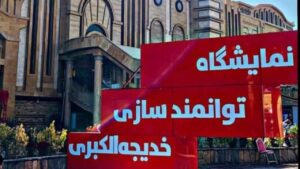 The “Khadijah al-Kubra” inaugural national and international exhibition for women, designed to empower and build a trade network for entrepreneurial women, has encountered obstacles and low attendance due to economic hardships and challenges.
The “Khadijah al-Kubra” inaugural national and international exhibition for women, designed to empower and build a trade network for entrepreneurial women, has encountered obstacles and low attendance due to economic hardships and challenges.
Maryam Mohammadi, one of the participants in this exhibition, speaking with Khaama Press, mentioned that women from various provinces of the country, including Helmand, Nimruz, Herat, and Nangarhar, have come together to showcase their products at this exhibition. They have displayed various products, including handicrafts, clothing, food items, and other goods.
According to Maryam Mohammadi, the presence of people at this exhibition has been scarce in the past two days because only women are allowed to attend.
Ms. Mohammadi adds that all the booths at this exhibition have had no sales so far, and due to the limited presence of visitors, some of the participants are considering closing their booths.
The Ministry of Industry and Commerce of the Taliban administration announced on Wednesday that the Khadijah Al-Kubra Exhibition will be held in Kabul from the 14th of November to the 20th of November in collaboration with the Women’s Chamber of Commerce and Industries.
The ministry emphasized that the Khadijah Al-Kubra Exhibition is being held to support children and mothers at the central exhibition grounds of Afghanistan in the Chaman Huzori district of Kabul.
Reports indicate that at least 850 entrepreneurial women have been allocated booths at this exhibition, where various products made by women from all provinces are displayed.
Humaira, one of the visitors to this exhibition, expressed her appreciation for such exhibitions, especially for women, and emphasized that women should be able to actively participate in all sectors of society, especially in economic activities.
She adds that while women have showcased their products in various corners of the country, their presence has been limited due to restrictions imposed by the Taliban administration and economic difficulties.
She further emphasizes, “I have seen as a visitor to this exhibition that very few women have made purchases, and they only bought essential items.”
Humaira considers the role of women in the country’s economy to be crucial and calls on responsible institutions to create opportunities for women in trade and advancement.
This comes as the World Bank had previously reported a reduction in the role of women in trade in Afghanistan, emphasizing that Afghanistan is among eleven countries in the world where women’s trade and business activities have decreased.
The bank cited changes in systems and restrictions on women’s work and education, which have hurt their economic and psychological aspects, as the reasons for the decline in women’s activities.
Adelbert Von Chamisso award winner highlights women’s voices on International Platforms
 Maryam Mitra, the only poet from Afghanistan, has been awarded the “Adelbert von Chamisso Literary Prize” for her literary achievements. She believes that such awards provide a platform for the voices of women through international forums.
Maryam Mitra, the only poet from Afghanistan, has been awarded the “Adelbert von Chamisso Literary Prize” for her literary achievements. She believes that such awards provide a platform for the voices of women through international forums.
The “Adelbert von Chamisso Literary Prize” for 2023 was presented to Maryam Mitra, a poet from Afghanistan, during a special ceremony.
Maryam is a poet, journalist, and media and communications researcher. She was born in Afghanistan in 1992 and holds a bachelor’s degree in journalism from Kabul and a master’s degree in sociology from Germany. Currently, she works as a researcher at Leipzig University, one of the world’s oldest universities and the second-oldest in Germany, located in the city of Leipzig in the state of Saxony.
Ms. Maryam Mitra, the poet of the collection “Life on the Margins,” said in an interview with Khaama Press that awarding such prizes to Afghan women enables the reflection of their voices through international platforms. She added that this award is not just an individual achievement but belongs to all Afghan women and girls.
Maryam further stated, “I strive to be a voice for Afghan women. Winning international literary awards for Afghan literature, especially women’s poetry, is of great significance. Poets’ discussions and the introduction of Afghan literature through international platforms create an opportunity for Afghan literature to reach a wider global audience and for speakers of other languages to become familiar with Afghan women and the overall situation in Afghanistan.”
Maryam Mitra has published two poetry collections, one in Persian and the other in German, and is considered a prominent figure in Afghan poetry and literature.
She describes literature as a saving force for expressing phenomena such as migration and exile: “Speaking in poetry is not just a space for expressing emotions for me; it is also a space for thinking and reflecting, as well as a tool for expressing and reflecting my experiences as a female exiled writer.”
This comes at a time when women and girls in Afghanistan have faced violations of fundamental rights, including education, employment, and participation over the past two years.
Reflecting on the current situation in Afghanistan under Taliban control, Maryam said, “The Kabul I know, which is present in my memories and poems, is not the Kabul I see now in videos, pictures, and news. However, I remain hopeful to see a Kabul where girls return to school, laugh out loud, and dream for the future. To continue and stand strong, we must be able to wipe our tears away, listen to each other’s voices, and believe in the strength and courage of women who are fighting for change in many parts of the world.”
The Bavarian Academy of Fine Arts Prize is awarded annually by the “Friedrich Boer Foundation” and the “Bavarian Academy of Fine Arts” to writers whose work holds value and appeal for German readers, even though their native language is not German. It comes with a prize of 10,000 euros.
It is worth noting that Maryam Mitra is the only poet from Afghanistan to have received this award, which has been presented since 1985 to writers who do not write in their native language but contribute to German literature.
Beloved Afghan Music Icon Ustad Mahwash retires after five decades
 Gulalai Farida, known as Ustad Mahwash, is one of Afghanistan’s most beloved musicians, earning titles such as “Ustad” (meaning master) and “Lady of Afghan Music” throughout her illustrious career. After five decades of artistic dedication, she bid farewell to the stage.
Gulalai Farida, known as Ustad Mahwash, is one of Afghanistan’s most beloved musicians, earning titles such as “Ustad” (meaning master) and “Lady of Afghan Music” throughout her illustrious career. After five decades of artistic dedication, she bid farewell to the stage.
Two days ago, Ustad Mahwash made a statement during a concert in Virginia, USA, featuring artists from Afghanistan and Tajikistan. She said, “Today, I am stepping down from the stage and deeply moved. How can I express that I can no longer sing.”
Gulalai Farida, later known as Mahwash, embarked on her musical journey at 21. In the 1970s, during the presidency of Mohammad Daoud Khan, she earned the title of “Ustad” (meaning master). Afghan musicians and experts in the field of music describe her voice as “magical.”
Cultural figures and music enthusiasts attest that Ustad Mahwash upheld the title of “Ustad” with utmost grace until her last moments.
Shekib Mosadeq, an artist, singer, and former judge on the Afghan Star, stated in an interview with Khaama Press that Ustad Mahwash was among the first women to strive for the normalization of Afghan women’s voices, paving the way for other female artists. Mr. Mosadeq emphasized the significance of Ustad Mahwash’s activities, saying, “Mahwash is an incredibly professional artist. Ustad Mahwash and Merman Parwin are the ones who paved the way for female vocalists like Hangama, Ms. Zhila, and others.”
Ustad Mahwash, in a recorded interview with BBC Persian, shared, “In my life, I have fallen in love three times: first with my fiancé, secondly with music, and thirdly with the youth of my homeland.”
Despite Afghanistan not providing an ideal platform for artists, especially female vocalists, Ustad Mahwash dedicated 56 years to this field, and most people know her for her romantic, mystical, and patriotic songs.
Ustad Mahwash considers her most significant artistic achievement her pairing with Ahmad Zahir. This beloved artist began her singing journey during her school days and transitioned to singing on Afghan radio after completing her education. She performed her first song, in 1946 in one of Afghanistan Radio’s studios.
At a concert in Virginia, USA, where she performed the famous song “Vaghti Aashq Shavi,” Ustad Mahwash bid farewell to singing and the stage, stating that she could no longer sing with the same passion and enthusiasm.
Javid Farhad, a poet and cultural figure in Afghanistan, described Ustad Mahwash as an artistically and personally unique phenomenon. He likened her voice to “the melodious sound of rain, filled with passion, freshness, and vitality.”
According to him, “Ustad Mahwash’s voice is the locked voice in the throats of thousands of suffering Afghan women, a voice that can be heard by the oven, behind a table, and in a bedroom.”
Ustad Mahwash’s retirement has elicited various reactions from her admirers. Khoshal Nabizada, a journalist and social activist, described Ustad Mahwash as a “great” human being and emphasized Afghanistan’s need for such influential figures.
Farzad Farnood, another social media user, wrote, “Ustad Mahwash bid farewell to singing at a time when singing for women in Afghanistan is still considered wrong and a crime.”
He added, “Mahwash endured difficult days and faced countless injustices from family and people, all to reach what she believed in.”
Ustad Mahwash created 1500 audio and video recordings during her artistic career and performed concerts in various countries. In 2003, she won the Asia-Pacific International Award for her artistic contributions and songs for Afghan children.
During her farewell performance, Ustad Mahwash stated, “A Muslim woman from Afghanistan can sing for years and continue her musical journey with white hair, just like anyone else in the world of music.”
Two Afghan women on BBC’s Top 100 Influential Women
 The BBC World Service has released a list of one hundred influential and inspiring women of 2023, which includes the names of Hossi Ahmadi, a television host, Shamshad, and Samia Tura, the founder of the “Friendship Afghanistan Network.”
The BBC World Service has released a list of one hundred influential and inspiring women of 2023, which includes the names of Hossi Ahmadi, a television host, Shamshad, and Samia Tura, the founder of the “Friendship Afghanistan Network.”
Hossi Ahmadi, a journalist and host at a private media outlet, in an interview with Khaama Press, mentioned that after completing her higher education in the fields of law and political science, she had spent seven years working in various segments of the media industry, including anchoring, political programs, news reporting, and programs advocating for women’s rights.
Ms Ahmadi added that people’s perceptions of media in Afghanistan vary significantly, and this motivation has led her to establish a foothold in the media despite challenging circumstances so that women, too, can be agents of change.
According to Hossi, the restrictions on journalists and media activities in Afghanistan are numerous, including the use of masks for female presenters and constraints on television discussions and debates, making it challenging for reporters, especially female journalists.
She emphasized that women and girls should have access to freedom and education, and she urged the global community to support Afghan women symbolically and take practical action.
This list, published by BBC on Tuesday, includes prominent figures worldwide. It features individuals like Amal Clooney (human rights lawyer), Michelle Obama (former First Lady of the United States), Janan Dagdagan (Turkish scientist and inventor), Olena Rozvadovska (children’s rights advocate from Ukraine), and Sarah Saqa (Palestinian general surgeon).
According to BBC’s report, Hossi Ahmadi is one of the few female presenters who continued her work in Afghanistan after the Taliban’s takeover in August 2021. Despite security concerns and social resistance against women in the media, she has persevered in her media activities and faced limitations due to her interviews and questions posed to the authorities of the Taliban administration.
Similarly, Samia Tura, a refugee rights activist from Afghanistan who established the “Friendship Network” to provide shelter for refugees and ensure access to education for affected students, is also included in BBC’s list of one hundred influential women.
BBC noted her role as an advocate for girls’ access to education under challenging circumstances and mentioned her collaborations with domestic and international organizations, including the United Nations agencies, the World Bank, the Malala Fund, and the Save the Children Foundation.
The Friendship Network organization was founded in 2021, following the rise of the Taliban administration, to provide essential resources and information to both domestic and foreign refugees in Samia Tura.
It’s worth mentioning that the BBC selects one hundred women every year who have significantly impacted essential events and recognizes those who have achieved significant success as influential individuals.
Last year, Fatema Amiri, one of the survivors of the terrorist attack on the Kawsar Educational Center in western Kabul, Tamana Zarayab Paryani, a women’s rights activist, and Zahra Joya, the founder of Rokhshana Media, were chosen as influential women by BBC in 2022.
Afghanistan Ends Unprecedented World Cup Journey
 Afghanistan played its ninth and final game of the ICC Men’s Cricket World Cup 2023 today (Friday), losing to South Africa by five wickets in Ahmedabad, Gujarat to claim the sixth spot so far.
Afghanistan played its ninth and final game of the ICC Men’s Cricket World Cup 2023 today (Friday), losing to South Africa by five wickets in Ahmedabad, Gujarat to claim the sixth spot so far.
Playing in only its third ODI World Cup, Afghanistan was inches away from making history by claiming a spot in the semi-finals of the tournament, having beaten three former world champions, Pakistan, England, and Sri Lanka.
Team Afghanistan ended the journey with four wins — against England, Pakistan, Sri Lanka, and the Netherlands — but lost to Australia, Bangladesh, South Africa, India, and New Zealand.
Some close losses and exceptional performances by Afghanistan amazed cricket analysts, who said that the team was no longer an underdog in the World Cup but a tough competitor.
The 23-year-old fast-bowling all-rounder, Azmatullah Omarzai was believed to be the best find in this World Cup not only for Afghanistan but for the world of cricket.
In his nine matches in the World Cup, he scored 353 runs with the bat and took seven wickets with the bowling.
Another young batter, Ibrahim Zadran, became the first Afghan player ever to score a World Cup century. It came against four-time world champion Australia.
The biggest achievement of all was that Afghanistan managed to qualify for the Champions Trophy 2025 for the first time ever.
Afghan athlete defeats Tanzanian rival
 Qais Khademi, a sportsman from Afghanistan, defeated his Tanzanian rival in the boxing competition.
Qais Khademi, a sportsman from Afghanistan, defeated his Tanzanian rival in the boxing competition.
This competition took place on Sunday, in the city of London, the capital of England. Qais Khademi, a sportsman from Afghanistan, demonstrated his prowess by defeating his Tanzanian rival in a boxing match, emerging victorious.
Khademi achieved victory in this competition by skillfully executing a technical move, allowing him to defend his international belt and emerge as the winner successfully.
It’s worth noting that before this, Qais Khademi, a professional Afghan boxer, had secured one of the most prestigious titles in the world of boxing, the IBO (International Boxing Organization) championship, and the European title by defeating his British opponent.
Qais Khademi, at 29, has established an impressive record in his career, boasting 10 victories and just 1 defeat. His latest triumph against his Tanzanian opponent secured his victory in that match and marked his milestone 10th victory overall.
Khademi’s consistent success and determination in the world of sports have earned him recognition as a formidable athlete, and his recent achievement highlights his remarkable journey in professional competition.
Zakaria Zamani, Afghan boxer, defeats Thai opponent
 Zakaria Zamani, a skilled athlete and boxer from Afghanistan, defeated his Thai opponent in a remarkable showdown.
Zakaria Zamani, a skilled athlete and boxer from Afghanistan, defeated his Thai opponent in a remarkable showdown.
On Sunday, November 26th, in Bangkok, Thailand, Zakaria Zamani, an athlete and boxer from Afghanistan, secured a victory by defeating his Thai opponent.
This competition occurred in Bangkok, Thailand, under the auspices of the “Promotion of Interests” organization.
According to the report, the event was held in the 67-kilogram weight category in Thailand, where Zakaria Zamani, an Afghan athlete and boxer, emerged victorious by defeating his Thai opponent in his respective weight class.
Zamani achieved this victory while his Thai opponent had a record of eleven fights, four wins, six losses, and one draw in the field of boxing.
Meanwhile, the Afghan boxer Mohammed Zamani has seven fights, five wins, and two losses in his boxing career.
Before this, Zakaria Zamani had already managed to defeat his Thai opponent in a previous boxing match, securing a victory.
This latest triumph adds to Zakaria Zamani’s successful boxing career, showcasing his skills and determination.
Ali Reza Asahi wins World Bodybuilding Championship in South Korea
 Ali Reza Asahi, the Afghan muscleman, stepped onto the stage and became the champion in the World Bodybuilding Championships held in South Korea on Thursday.
Ali Reza Asahi, the Afghan muscleman, stepped onto the stage and became the champion in the World Bodybuilding Championships held in South Korea on Thursday.
Asahi competed in the 90-kilogram weight category and the over-40 age group, securing the gold medal as the top athlete in this weight class.
Asahi made history as the first representative of Afghanistan in these competitions, facing off against his opponents.
On the day after tomorrow, on Sunday, Mohammad Ayub Azimi and Asahi will also take the stage in the 100-kilogram and 90-kilogram weight categories.
Ali Reza Asahi, the Afghan muscleman and silver medalist from the 2023 South Asian Championships in the Maldives, has proven himself once again on the world stage.
Despite the evident talent and potential within the Afghan sporting community, the Taliban’s stringent regulations on bodybuilders, including requirements to cover their bodies during training and competitions, cast a shadow of uncertainty over the future of sports in the country.
Meanwhile, the resurgence of the Taliban has prompted an exodus of athletes and sports officials, reminiscent of the bleak period during their previous rule from 1996 to 2001 when sports, music, and movies were forbidden.
The current restrictions on bodybuilding, a sport that thrived in Afghanistan in the post-Taliban era, have cast a pall over its once-promising future.
Subscribe Now
Don’t miss our future updates! Get Subscribed Today!
© 2023 White Assembly. All Rights Reserved.
